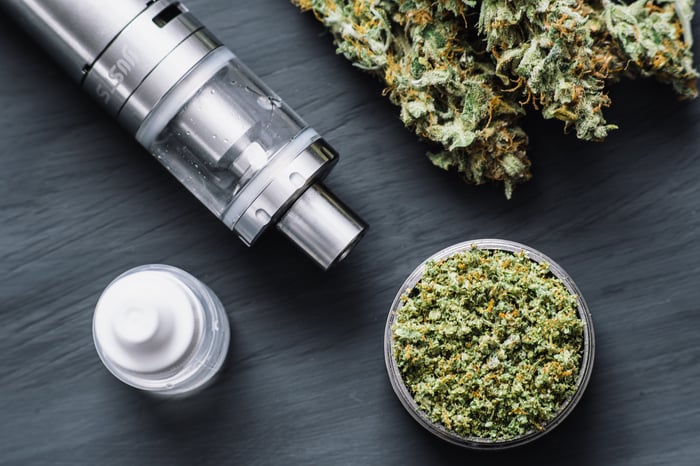Marijuana might just be the fastest growing industry on the planet over the next decade, but that doesn't mean it's immune to growing pains. Over the past year, a number have (pardon the pun) cropped up.
To our north, Canada has been contending with supply issues that have kept legal supply out of the market. Regulatory agency Health Canada has been unable to review and approve cultivation, processing, and sales license applications in a timely manner. At the same time, select provinces have been slow to grant licensing approval to physical retail locations, coercing consumers to purchase from the black market.
In the United States, high tax rates have been a big problem. California, the largest cannabis market in the world by annual sales, can pass along an aggregate tax rate of up to 45%, which includes state and local taxation, an excise tax, and wholesale tax on either dried cannabis flower or cannabis leaves. Municipalities within the Golden State have also been guilty of either not approving retail locations or slow-stepping the licensing process, thereby minimizing how many dispensaries are actually in operation.

Image source: Getty Images.
But what's arguably been the most unexpected and scariest hurdle of all for the pot industry has been the vaping-related health scare in the United States over the past couple of months.
The CDC may have identified the source of vape-based mystery lung illnesses in the U.S.
Since summer, the Centers for Disease Control and Prevention (CDC) in the U.S. had identified 2,051 confirmed or probable cases of mystery lung illnesses tied to vaping, and 39 people have died (that's of Nov. 5, 2019). The CDC, which has been providing updates on this vape-related health scare on a weekly basis, hasn't had anything concrete to report regarding the cause of these mysterious lung illnesses throughout September or October other than to suggest that consumers avoid vaping liquids containing tetrahydrocannabinol (THC), the cannabinoid that gets users high.
However, that changed last week.
In the latest vaping health-scare update, the CDC released new laboratory findings that suggest vitamin E acetate is the "potential chemical of concern." The CDC announced that it analyzed fluid samples taken from the lungs of 29 patients in 10 states, and vitamin E acetate was found in all 29 samples. Previous research from the CDC found that vitamin E, when inhaled, may interfere with normal lung function.

Image source: Getty Images.
Furthermore, the CDC tested for other chemicals known or suspected to cause lung/health problems, such as plant oils and a variety of petroleum distillates, including medium-chain triglyceride (MCT) oil and terpenes. The agency discovered that none of these were found in the 29 lung fluid samples, which isn't surprising given that manufacturers are actively keeping MCT oil and other potentially harmful additives out of vape products.
With more testing being conducted, it's looking as if the culprit of this vitamin E acetate is illicitly produced vape products that aren't being subjected to the same quality and/or purity standards as legal-channel products. However, the CDC is still holding firm to its recommendation that people "not use e-cigarette, or vaping, products that contain THC, particularly from informal sources like friends, or family, or in-person or online dealers."
It's good news-bad news for cannabis stocks
There's no question that identifying the likely chemical culprit of vape-related lung illnesses is a big step in curbing consumer fears. Even with more testing being done by the CDC, the fact that most of these issues are likely originating from the black market provides solid evidence that could funnel worried vape users into legal channels.
Although a number of North American cannabis companies expect to lean on vape sales to bolster their margins, this CDC announcement is particularly good news for Cronos Group (CRON 2.00%) and KushCo Holdings (KSHB).
Cronos received a $1.8 billion equity investment from tobacco giant Altria Group (MO 0.68%) in March. While this cash was certainly needed for Cronos to execute on various aspects of its growth strategy, it's the marketing and distribution expertise of Altria that was really expected to prove valuable.
Altria owns a 35% stake in popular vaping device Juul, and the expectation is that Altria would eventually assist Cronos in developing a range of vape products for the North American market. With a potential chemical being pinpointed as the culprit for the vaping crisis, the intermediate-term outlook for Cronos and Altria potentially brightens a bit.

Image source: Getty Images.
The same could be said for KushCo, which generates the bulk of its sales from vaporizers. Although KushCo also generates revenue from its packaging and branding solutions business and via the sale of hydrocarbon gases used in the production of cannabis oils, vaporizers are the company's bread and butter for the time being. The CDC's recent findings may ease some of the pressure placed on U.S. vape sales, thereby allowing KushCo to easily meet or surpass its 2019 and 2020 sales forecasts.
Then again, it's important to recognize that the CDC hasn't given vaping a clean bill of health. In fact, the CDC continues to recommend that consumers not vape any product containing THC, which is a major blow considering that vaping is expected to be the leading source of derivative sales for the U.S. marijuana industry. While this doesn't mean consumers will necessarily listen to the CDC's warning, the War on Tobacco for decades has led to a steady decline in adult smoking rates.
Suffice it to say that some level of uncertainty surrounding the vape industry, even with the latest CDC update, is liable to continue for the foreseeable future.





